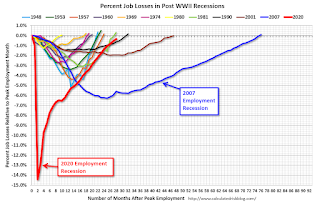 Click on graph for larger image.
Click on graph for larger image.• First, currently there are still about 500 thousand fewer jobs than in February 2020 (the month before the pandemic).
This graph shows the job losses from the start of the employment recession, in percentage terms.
The current employment recession was by far the worst recession since WWII in percentage terms. However, the current employment recession, 28 months after the onset, has recovered quicker than the previous two recessions.
• ADP Report: The ADP employment report has been "paused" and is being retooled.
• ISM Surveys: Note that the ISM services are diffusion indexes based on the number of firms hiring (not the number of hires). The ISM® manufacturing employment index decreased in July to 49.9%, up from 47.3% last month. This would suggest about 20,000 jobs lost in manufacturing.
The ISM® services employment index increased in July to 49.1%, up from 47.4% last month. This would suggest service employment was increased about 50,000 in July.
Combined, the ISM surveys suggest only 30,000 jobs added in July.
• Unemployment Claims: The weekly claims report showed an increase in the number of initial unemployment claims during the reference week (includes the 12th of the month) from 233,000 in June to 261,000 in July. This would usually suggest a few more layoffs in June than in May. In general, weekly claims were above expectations in July.
• COVID: As far as the pandemic, the number of daily cases during the reference week in June was around 125,000, up from 105,000 in June.
• Conclusion: The consensus is for job growth to slow to 250,000 jobs added in July. Overall, the ISM surveys improved, but still suggested few jobs added in July. Unemployment claims increased during the reference week. This suggests a weaker than expected employment report for July.